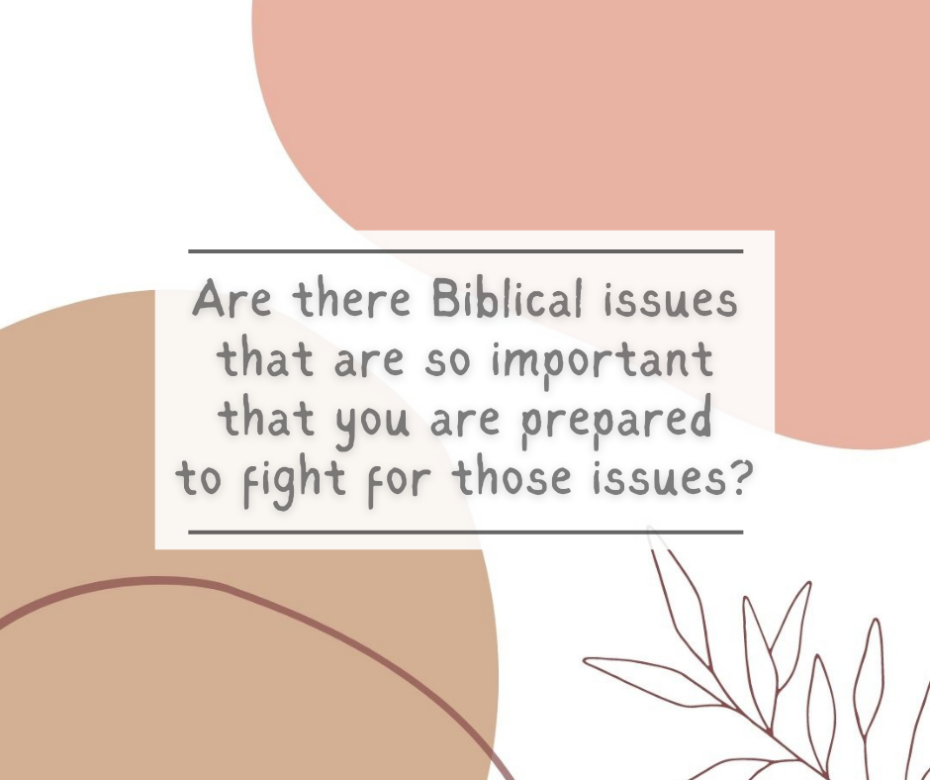One of the areas all Christians struggle with is how to determine what issues we should fight for and which ones we can let go. Specifically, how should we deal with other believers when we disagree on points of theology? All of us agree that Christians can, and often do, fight over trivial issues. These issues are areas in which the Bible is not completely clear and are open to different interpretations. In seminary, we joked about believers arguing over how many angels can dance on the head of a pin.
Believers often find it difficult to agree on what the trivial issues are. Can a woman be a deacon? Is it okay in some instances for a divorced believer to remarry? What does the “husband of one wife” mean? Who are the leaders of a church, and how are such leaders chosen? Should communion be open to all who profess to be believers? Should communion be a full meal, and what does the bread represent? When should we excommunicate a member of our church? Is having a membership role for a church even Biblical? Should a believer drink a beer?
I was a military chaplain for 25 years and worked with chaplains from many different denominations. There were disagreements on everything. This list could go on and on and on. To make matters worse, probably all of us who have been believers for a long period of time have changed our minds about what is trivial and what is not. We all have a list of things that we say we can agree to disagree on. In time, that list may even get longer and longer.
Whatever your list includes, we all recognize that there are things that belong on that list. We see Christians fighting over things that they shouldn’t fight over. We all agree that the Lord is not pleased with what He sees when this occurs. There are times when we as Christians should hold our tongues and keep our opinions to ourselves. For the sake of unity and peace, we don’t have to present our case for every issue that comes up. Sometimes, fewer words are better.
But there is the other side of the coin in this matter. There are things we should fight for. There are times when fewer words are not the answer.
Jeremiah is an OT example of this truth. The Lord had told him to tell the nation that if they didn’t repent, He would punish them through the Babylonians. Jerusalem and the temple would be destroyed. Not everybody agreed with that message. Other religious leaders, such as the priests and prophets, pointed out that God had said His name would be associated with Jerusalem forever. In the past, God had spared the nation when it had strayed from Him. Jeremiah was needlessly troubling the people with his message of doom and gloom.
But God told Jeremiah to hold nothing back. He was to speak to “all” the people in the very public court of the temple. He was to speak “all” the words God had told him. He wasn’t to leave out a single one. In doing so, Jeremiah was not preaching a message of peace and unity. In fact, he was put on trial, with his opponents asking for him to be put to death (Jer 26:11).
In this example, we see another danger that the child of God can face when it comes to his words. Unity and peace are good things, and Jeremiah could have reasoned that his words were contentious and were better left unsaid. Maybe God would relent of what He said He would do. The priests running the temple of the Lord certainly thought so. Maybe the people wouldn’t listen to Jeremiah’s words anyway, so why stir up their emotions? Most importantly of all, was any message worthy of losing his life over?
Of course, we all acknowledge that Jeremiah did the right thing. He was willing to disagree with other religious leaders and call them out. He was not willing to hold back his words on this occasion. The desire for peace and unity did not override the importance of speaking the truth. The people needed to hear what the Lord had said. They would be harmed if they did not heed the words of Jeremiah.
Are there occasions like that for us today? Surely, there are. Even in the wider Free Grace circles, one stands out. What should we do about the assurance of salvation? We are told that many good people do not believe it is of primary importance. We all know folks who don’t believe in it at all. We do not need to mention it when we present the gospel. We can agree to disagree.
But if we go to any church meeting on any Sunday and look out at the congregation, we will see people who are harmed by the lack of assurance. They fear that they are not saved or have lost their salvation. Free Grace theology tells us Christ’s promise of eternal life entails the assurance of that gift. Should we, in the interest of unity, hold back and not tell this wonderful truth to the people we meet?
This is no trivial matter. It is at the very heart of what the Lord taught. People are experiencing severe spiritual harm because they do not understand it.
It is good to have a list of things about which we say, “I don’t want to fight about that.” I have a pretty long list of such things. But there are other matters that are more important than our desire to get along. Jeremiah is an example for us. Assurance is one of those things. It doesn’t belong on the trivial list.


